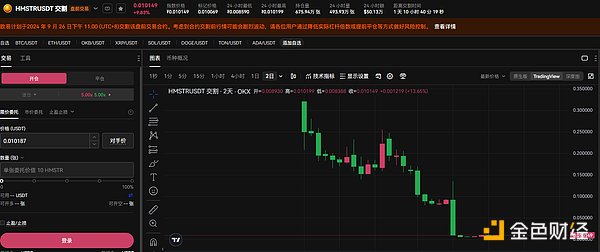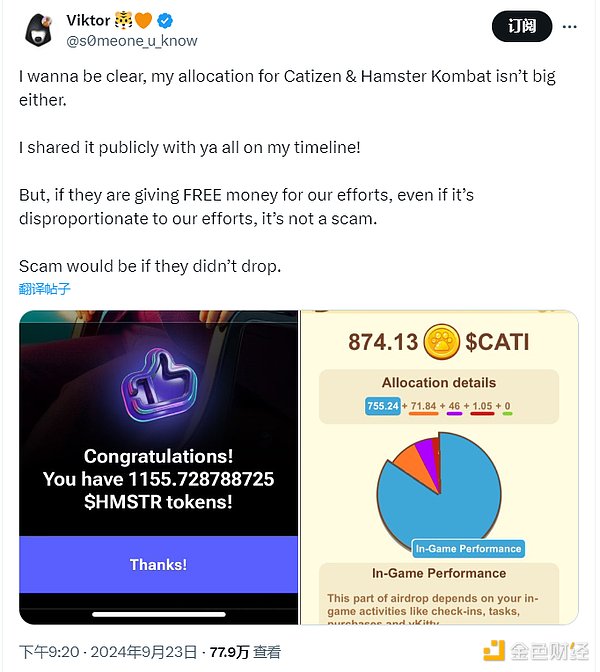Author: Climber, Golden Finance
TON ecosystem game token Hamster Kombat (HMSTR) will be officially launched on major exchanges on September 26, and the project will also airdrop for players on the same day. But what community members, especially those who are deeply involved in the game, did not expect was that the airdrop reward was seriously disproportionate to the effort.
As of writing, OKX pre-market trading information shows that the trading price of HMSTR is only about $0.001, and the airdrop reward of 100 HMSTR is only $1. On the other hand, the guaranteed income of TON projects such as Notcoin, DOGS, and Catizen that were previously listed on the exchange is also a "pig's foot meal".
In response, many community members called it a scam and asked Hamster Kombat to redistribute the rewards. However, the game project seems to deliberately make things difficult for the Mao party, not only limiting the proportion of players receiving airdrops, but also severely cracking down on cheating. This can't help but make the Mao party hesitate whether to participate in the TON mini-game project that has not issued coins.
High popularity and low returns, the wealth creation effect of TON ecological projects has slowed down
Hamster Kombat is a cryptocurrency exchange CEO simulator P2E game built on the Telegram applet platform. Players can increase their income by completing tasks, upgrading their profiles, inviting friends, etc., and can further expand their income sources through the in-game recommendation system.
The project has quickly accumulated a large number of users through its unique game mechanism and extensive community participation. It attracted 239 million registrations within three months and applied for the Guinness World Record, becoming the first YouTube channel with more than 10 million subscribers in a week. Now Hamster Game has a user base of nearly 300 million, with 82 million monthly active users and 32 million daily active users. TG's CEO even called Hamster Game the latest Internet phenomenon, which has triggered a cultural out-of-circle.
The core token of Hamster Kombat is HMSTR. Players can earn and trade this token in the game to upgrade their characters, participate in limited-time events, unlock rare items, etc. The token is not only used for in-game transactions, but also plays an important role in the platform's economic system.
Not long ago, Hamster Kombat announced that it would be launched on major mainstream trading platforms on September 26, and airdrops would be carried out simultaneously. With the announcement of the airdrop mechanism and the prices shown on pre-market exchanges, community members found that the benefits they could obtain were extremely meager.
According to the official tweet, players can only claim 88.75% of the tokens, and the remaining 11.25% will have to wait for 10 months, and are expected to be claimed in July 2025. The Hamster Kombat team revealed that of the 300 million players who have played Telegram games so far, only about 129 million ultimately qualified. Of the total 100 billion HMSTR tokens, 60 billion will be issued in this airdrop, and another 15 billion tokens will be reserved for the upcoming Season 2 of the game.
And previously Hamster Kombat issued a statement saying that it has launched anti-cheat detection, and some cheaters will unlock the "Cheating is bad" achievement to convey an important reminder to cheaters. The official said that it hopes to protect players and community members who work hard to "liver" the game and give them the opportunity to get a fair share of the airdrop.
Afterwards, about 2.3 million users were "banned for cheating" to receive airdrops, and the project party stated that 6.8 billion tokens have been recovered from these cheaters. 50% have been distributed to honest players, and the other 50% will be burned.
However, the project party's airdrop posture is very high-profile, but the pattern seems a bit narrow, and the benefits to players are almost negligible. According to OKX pre-market trading information, the price of HMSTR is only about US$0.001.

A level 7 Hamster Kombat user received an airdrop of 100 HMSTR tokens, which is only worth $1 at the current price.

The above picture is a table of popular TON listed projects made by a community member. Judging from the popularity of the listed projects and the feedback from the previous airdrop participants, the highest return is NOT, followed by DOGS and CATI. The guaranteed return after spending a certain amount of time and energy to participate is about equal to a "pork trotter meal". (Note: The highest price of CATI is now $1.11 and the lowest is $0.73)
Hamster Kombat requires players to participate for as long as half a year, but the final rewards are very few, which makes many community members angry.
Meager rewards lead to community condemnation, Hamster Kombat is caught in a "scam" storm
As early as June 7, Hamster Kombat issued a statement saying that the user's airdrop distribution will depend on the profit per hour (PPH) and some other activity parameters released by the team in the future, rather than the number of token balances. In addition, Binance Launchpool and Super Earn Coin announced the launch of the project, which also made many players invest more time and energy. However, the rewards given to players by the project party are very interesting.
This airdrop distribution mechanism of the Hamster Kombat project party first angered Russian players. Local media pointed out that "after playing the game for several months", players' efforts "can only get 5 to 15 US dollars" in return. And Viktor Pershikov, a crypto security expert in the country, said that those who "want to get rich by playing Hamster Kombat" are "finding their expectations unfulfilled", which will cause their tokens to face selling pressure when trading is opened.
Interestingly, in July, the chairman of the Russian State Duma Financial Markets Committee called Hamster Kombat a "scam" that was manipulative and deceptive. He said the project was manipulating and exploiting the psychology of citizens, especially those who did not really want to work, but dreamed that they could get rich with minimal effort
In addition, Aksakov criticized the activities that Hamster Kombat users needed to complete in order to get airdrops, saying that "people are gullible."
However, under the heat of the previous TON narrative, the wealth effect brought by multiple ecological projects still attracted many people. When HMSTR made the community work hard for several months, but only gave the players a meager income in the end, many people began to accuse the project of fooling the players, and even called the project a "scam."
Community member @TheSolucky said that Hamster said they would distribute airdrops according to PPH, but in the end they would distribute them according to the number of invited friends. Isn't this a scam?
However, some community members believe that Hamster Kombat is not a scam and defended it.

KOL@s0meone_u_know believes that even if the airdrop rewards are disproportionate to the players' efforts, it is not a scam because the project party allows players to get funds for free.
In response, another community member @iamdeejayjet retorted that the airdrop rewards are not free money because users have invested time, data, dedication, and they have made the project global. The project party earns income through monetization and CEX traffic, etc.
Crypto scientist @CryptoKingKeyur conducted cross-examination, saying that Hamster Kombat's words and deeds were inconsistent and there was deception of users. First of all, the project white paper did not mention that 12% of the tokens would be locked, and secondly, it promised the largest airdrop in history, and the community received 60% of the total allocation, but most players spent months of hard work and only received very few rewards.
As for Hamster Kombat's meager rewards, some community members said they would unite to unfollow them.
KOL@Cryptowithkhan said that Hamster Kombat deceived the community and it was time to repay them. The project party used the players' attention to gain traffic on YouTube to make huge amounts of money, but did not give back to the gamers. He has unfollowed on every social media platform and now hopes that other community members will do the same. If players remain silent, more projects like Hamster Kombat will appear.
Conclusion
The airdrop of Hamster Kombat this time is so small that it is hard to accept, especially for those who have invested a lot of time and energy in the airdrop. However, the attitude of the project party before and after the airdrop was very high-profile. Judging from the launch time of the project, the strength of anti-witch cheating, and the operation of airdrops in batches, it seems to have the style of a big moneymaker. However, the benefits given to players in the end are very scarce, which is obviously a harm to both the community and the projects on TON that have not yet issued coins. In particular, the money-grabbing party needs to carefully consider the subsequent efforts of TON projects.
 ZeZheng
ZeZheng
 ZeZheng
ZeZheng JinseFinance
JinseFinance JinseFinance
JinseFinance JinseFinance
JinseFinance JinseFinance
JinseFinance Olive
Olive Numen Cyber Labs
Numen Cyber Labs Bitcoinist
Bitcoinist Bitcoinist
Bitcoinist Bitcoinist
Bitcoinist